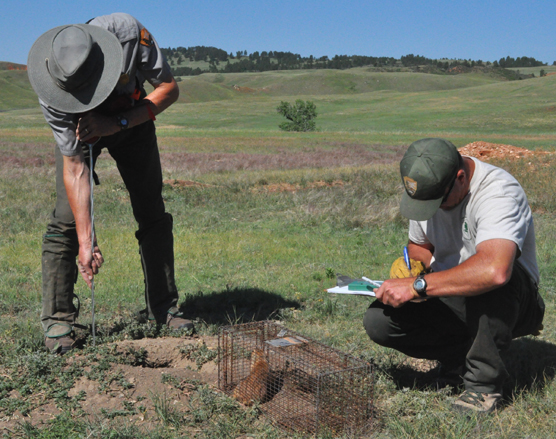|

NPS Photo
Contact: Tom Farrell, 605-745-1130 WIND CAVE NATIONAL PARK, SD – Wind Cave National Park is one of 34 areas testing a vaccine to prevent the spread of sylvatic plague in prairie dog populations. If successful, it could be used to protect the park's endangered black-footed ferret which relies on the prairie dog for food. "We're working in conjunction with the U.S. Geological Survey and the U.S. Fish and Wildlife Service on these trials," said Park Superintendent Vidal Dávila. "If proven effective, the vaccine will be used by government agencies across the west to vaccinate selected populations of prairie dogs in specific areas." The sylvatic plague vaccine (SPV), embedded in gelatin bait, was scattered around the park's test prairie dog colony in late June. This week park staff are trapping prairie dogs and taking a variety of samples including blood to test for the presence of the vaccine, combing the animals for fleas which can then be tested for plague, pulling hair samples, and attaching ear tags to mark the animal should it be recaptured. Outbreaks of plague in prairie dog towns are the biggest threat to the survival of the endangered black-footed ferret. Prairie dogs make up almost all of a black-footed ferret's diet. It was the loss of prairie dog habitat that led to the near extinction of the ferret. Field trials began in seven western states in 2013 and will continue into 2016. Results of the study are expected at the earliest in 2016 with the vaccine being available for use a few years after that. If successful, the vaccine will be regulated by the USDA Center for Veterinary Biologics as an experimental vaccine for use by government agencies only. The SPV project is a collaborative effort among more than 30 federal, state and tribal agencies and nongovernmental organizations. They are collectively providing funding for the current field testing. Sylvatic plague is a deadly, exotic disease that affects wildlife and occasionally infects people and pets. If diagnosed early, people infected with plague can be successfully treated. |
Last updated: April 10, 2015
